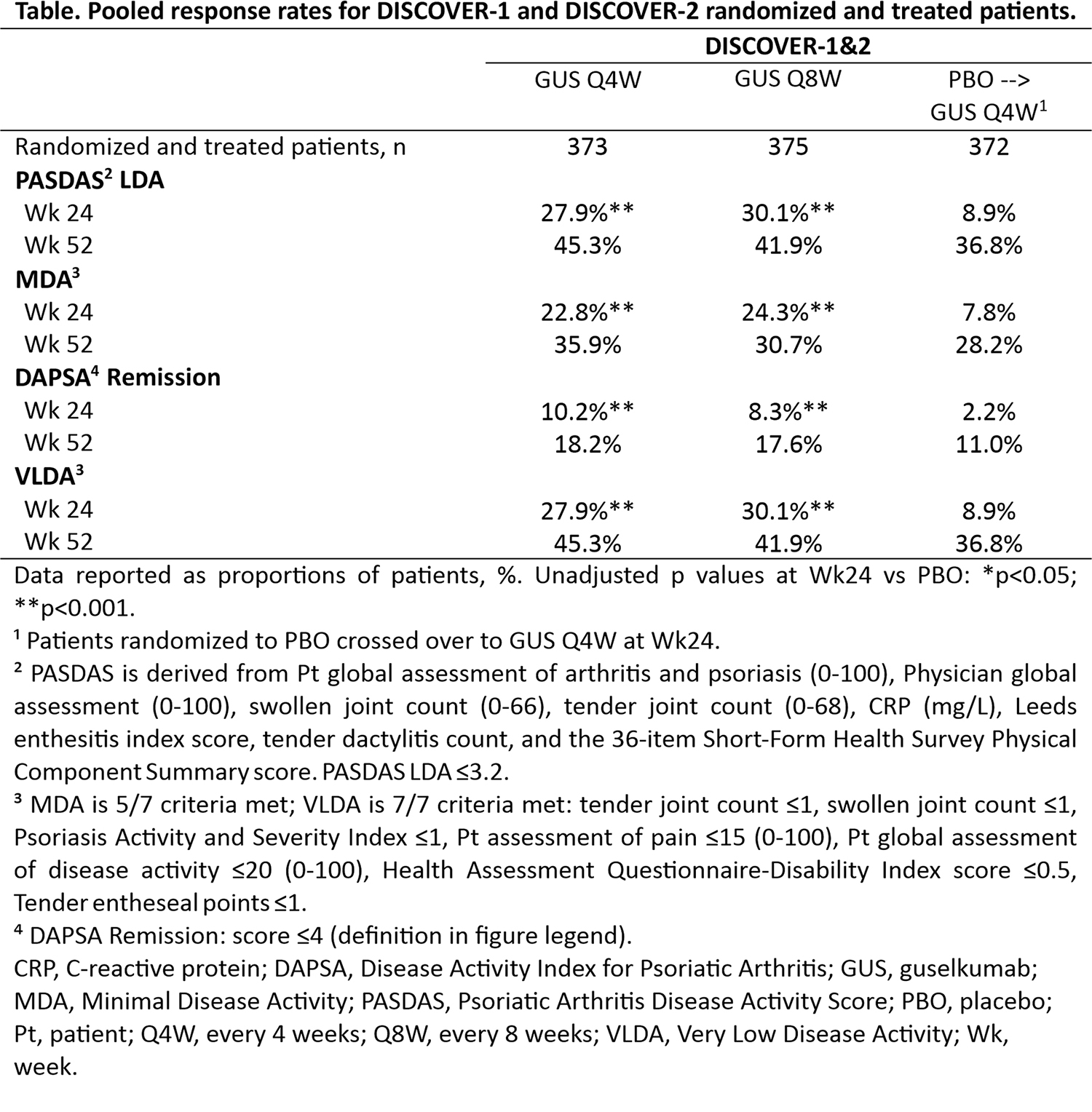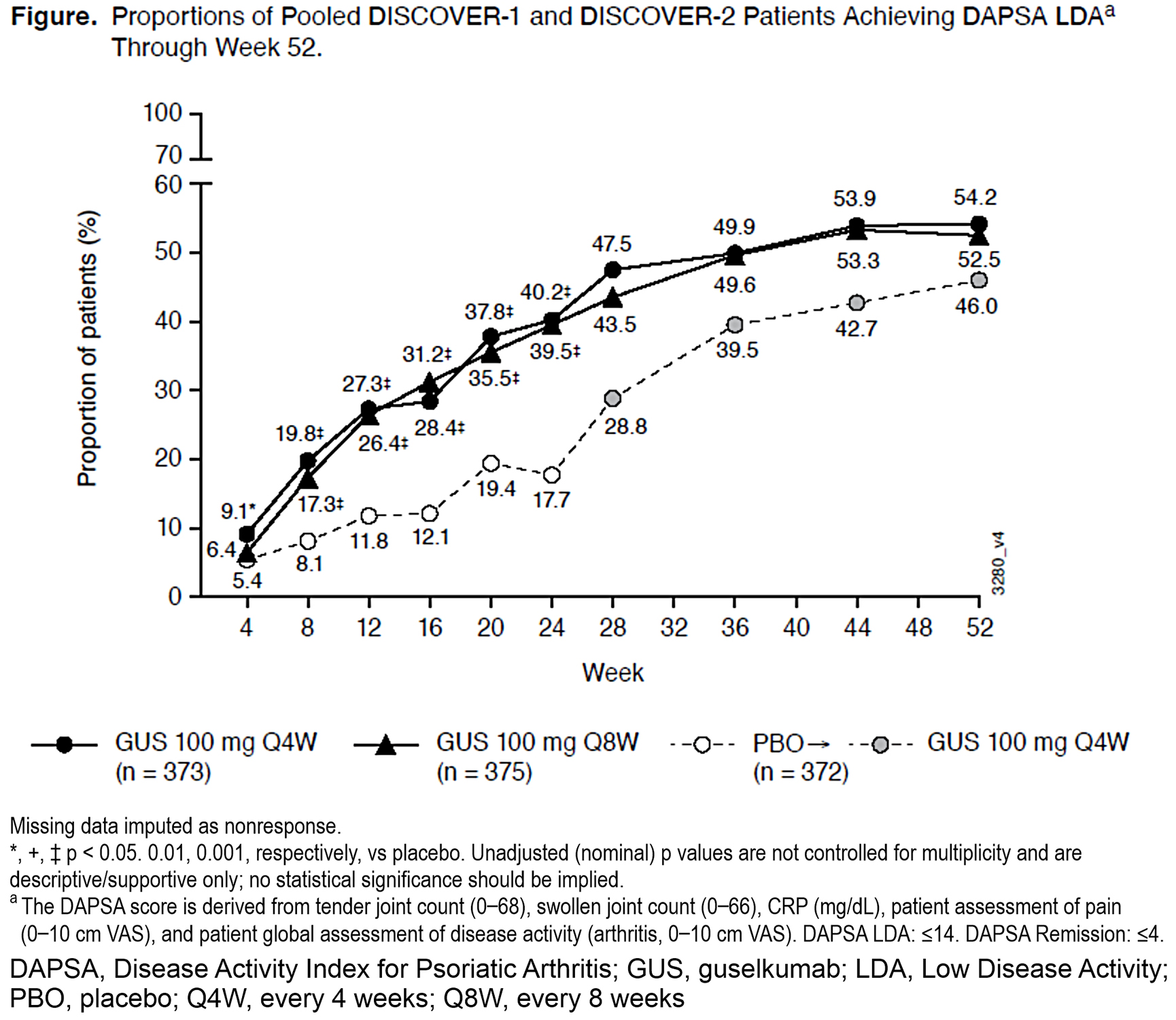Session Information
Date: Monday, November 8, 2021
Title: Spondyloarthritis Including PsA – Treatment Poster II: Psoriatic Arthritis I (1329–1363)
Session Type: Poster Session C
Session Time: 8:30AM-10:30AM
Background/Purpose: Guselkumab (GUS) is a human monoclonal antibody specific to the p19-subunit of interleukin-23. GUS significantly improved signs and symptoms of PsA through Week 24, and improvements were maintained through Week 52 in the phase 3 DISCOVER-11 and DISCOVER-22 studies. This study assessed GUS efficacy through Week 52 in DISCOVER-1&-2 using composite indices.
Methods: Adult patients enrolled had active PsA despite standard therapies. Patients in DISCOVER-1 had ≥3 swollen and ≥3 tender joints and C-reactive protein (CRP) ≥0.3 mg/dL; in DISCOVER-2, patients had ≥5 swollen and ≥5 tender joints and CRP ≥0.6 mg/dL. 31% of DISCOVER-1 patients received 1-2 prior tumor necrosis factor inhibitors; DISCOVER-2 patients were biologic-naïve. Patients were randomized 1:1:1 to GUS 100 mg every 4 weeks (Q4W); GUS 100 mg at Week 0, Week 4, then every 8 weeks (Q8W); or placebo (PBO); PBO patients crossed over to GUS 100 mg Q4W at Week 24. Composite endpoints pooled across the two studies were: Disease Activity Index for Psoriatic Arthritis (DAPSA), Psoriatic Arthritis Disease Activity Score (PASDAS), Minimal Disease Activity (MDA), and Very Low Disease Activity (VLDA). GUS versus PBO comparisons through Week 24 employed a Cochran-Mantel-Haenszel test with baseline stratification factors or Fisher’s exact test; no treatment group comparisons were performed beyond Week 24. P-values were not adjusted for multiplicity. From Week 24 -Week 52, patients with missing data were considered nonresponders ( >90% of patients completed study treatment through Week 52).
Results: In randomized and treated patients from DISCOVER-1 (N=381) and DISCOVER-2 (N=739), pooled baseline characteristics were generally well-balanced across treatment groups and reflected active disease. Differences in response rates between GUS Q4W or Q8W and PBO were seen as early as Week 8 and increased over time through Week 24. In patients continuing GUS Q4W or Q8W, respectively, post-Week 24 response rates associated with these composite indices continued to increase through Week 52, at which time they were 54.2% and 52.5% for DAPSA LDA, 45.3% and 41.9% for PASDAS LDA, 35.9% and 30.7% for MDA, 18.2% and 17.6% for DAPSA remission, and 13.1% and 14.4% for VLDA, with no discernable difference between the GUS Q4W and Q8W dosing regimens (Table and Fig). After PBO patients crossed over to GUS Q4W at Week 24, response rates increased through Week 52.
Conclusion: GUS 100 mg Q4W and Q8W provided robust and sustained benefits to patients with active PsA across multiple domains, indicating that GUS may provide an alternative treatment option for the diverse manifestations of PsA.
References:
1Ritchlin CT, et al. RMD Open. 2021;7(1):e001457
2McInnes IB, et al. Arthritis Rheumatol. 2021;73(4):604-616
To cite this abstract in AMA style:
Coates L, Ritchlin C, Gossec L, Helliwell P, Rahman P, Hsia E, Kollmeier A, Xu X, Karyekar C, Shawi M, Noel W, Jiang Y, Sheng S, Wang Y, Mease P. Guselkumab Provides Sustained Domain-Specific and Comprehensive Efficacy as Assessed Using Composite Endpoints in Patients with Active Psoriatic Arthritis [abstract]. Arthritis Rheumatol. 2021; 73 (suppl 9). https://acrabstracts.org/abstract/guselkumab-provides-sustained-domain-specific-and-comprehensive-efficacy-as-assessed-using-composite-endpoints-in-patients-with-active-psoriatic-arthritis/. Accessed .« Back to ACR Convergence 2021
ACR Meeting Abstracts - https://acrabstracts.org/abstract/guselkumab-provides-sustained-domain-specific-and-comprehensive-efficacy-as-assessed-using-composite-endpoints-in-patients-with-active-psoriatic-arthritis/


